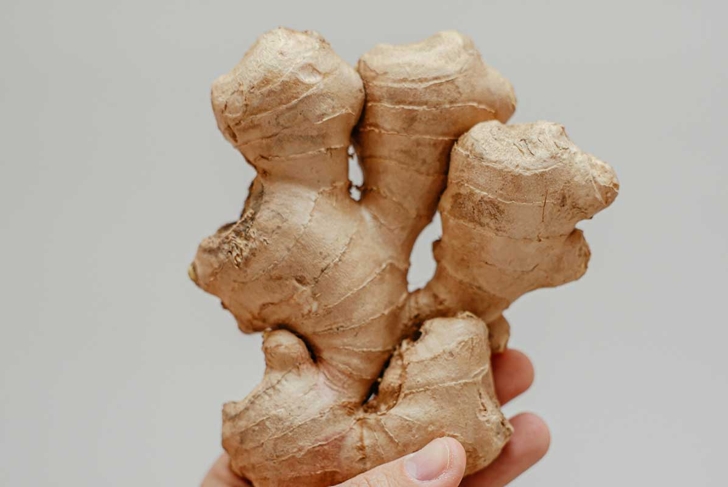11 Best Natural Remedies for Bloating
Find Relief with These Simple Tips.

If you’ve ever experienced bloating, you know how uncomfortable (even painful) it can be. This common issue affects almost one in seven people weekly, particularly women. Bloating can feel like abdominal fullness, pressure, or trapped gas, and it’s often caused by diet, lifestyle, and digestive issues. Fortunately, natural remedies may help prevent and relieve bloating.
Identify and limit trigger foods

We all know prevention is better than a cure. If you’re experiencing regular bloating, there might be certain foods triggering it.
Every person is different, but certain common foods can trigger bloating:
- beans
- dairy products for those with lactose intolerance
- sugar-free gums and candy that may contain artificial sweeteners
- fruits high in fructose, including apples, apricots, bananas, and dried fruit
- vegetables like broccoli, Brussels sprouts, cabbage, and cauliflower
- carbonated drinks like soda and beer
- wheat products for those with gluten sensitivities or intolerances
Create a food diary

If you’re not sure what impacts your bloating, start writing a food diary so you can keep track of patterns. Perhaps dairy isn’t a problem for you, but you notice every time you eat a plate of pasta, you end up feeling uncomfortable. By keeping a food diary, you can narrow down your problem foods and help avoid them.
Try a low-FODMAP diet

If your bloating is related to a bowel condition like irritable bowel syndrome (IBS), you might consider a low-FODMAP diet. Studies have found a low-FODMAP diet can reduce bloating in people with IBS. FODMAPs are types of carbohydrates that are poorly absorbed and digested in the small intestine. High-FODMAP foods include certain fruits, vegetables, and dairy products. Your healthcare practitioner can help guide you through the process.
Eat mindfully and slowly

When we eat on the run or are distracted by digital devices, we often eat too fast. This leads to swallowing air and eating too much, both of which can increase bloating. To avoid this, eat more mindfully:
- Sit down while eating.
- Chew your food slowly.
- Avoid distractions.
Get regular exercise

Exercise is important for not only physical and mental health, but also digestion. One study found a 10- to 15-minute stroll after eating can reduce bloating symptoms. Aim for at least 150 minutes of moderate-intensity exercise each week to help improve your health.
Stay hydrated

Dehydration can cause your body to retain water and lead to bloating. Not drinking enough water can also lead to constipation, which is one of the key causes of bloating. Not sure how much you should drink? According to the National Academy of Medicine, men should drink around 13 cups while women should drink around 9 cups per day.
Try peppermint

Peppermint is well known for relieving digestive complaints. In particular, peppermint oil capsules can help relax intestinal muscles to reduce bloating, particularly if you have IBS. Many people also swear by peppermint tea, and although there has been little human research, animal studies show it can have a relaxing effect on the digestive system.
Eat more ginger

Ginger is another tasty and versatile food that can help reduce bloating. It helps improve digestion by emptying the stomach faster, so bloating is less likely. There are many ways you can add more ginger to your diet:
- Make fresh ginger tea.
- Add it to savory dishes.
- Bake with it.
- Pickle it.
- Add it to a smoothie (try this delicious Matcha Coconut Ginger Smoothie!).
Add fennel seeds

Fennel seeds are one of the world’s oldest medicinal herbs. They’ve been used for centuries around the world as a nutritional aid for digestive disorders. In fact, fennel seeds are often served after dinner in South Asian restaurants to freshen breath and support digestion. Try incorporating them into your diet by adding their bold, warm flavor to recipes or making fennel seed tea.
Massage your abdomen

Abdominal massage can help relieve constipation and bloating. Massaging your stomach helps move food along your gastrointestinal tract, so you get rid of gas and bloating quicker. You can even give yourself an abdominal massage with this three-step process from Michigan Medicine at the University of Michigan.
Take probiotics

Probiotics are good bacteria that support a healthy gut microbiome and can help with bloating. You can find probiotics in foods and supplements:
- yogurt
- kefir (a type of fermented milk)
- fermented foods (sauerkraut, kimchi, or miso)
- probiotic supplements
When to seek help
Although bloating is common, if you’re concerned or it’s accompanied by severe symptoms (like weight loss, severe constipation, or blood in your stool) chat with a healthcare practitioner.
THIS ARTICLE WAS ORIGINALLY PUBLISHED ON ALIVE.COM

